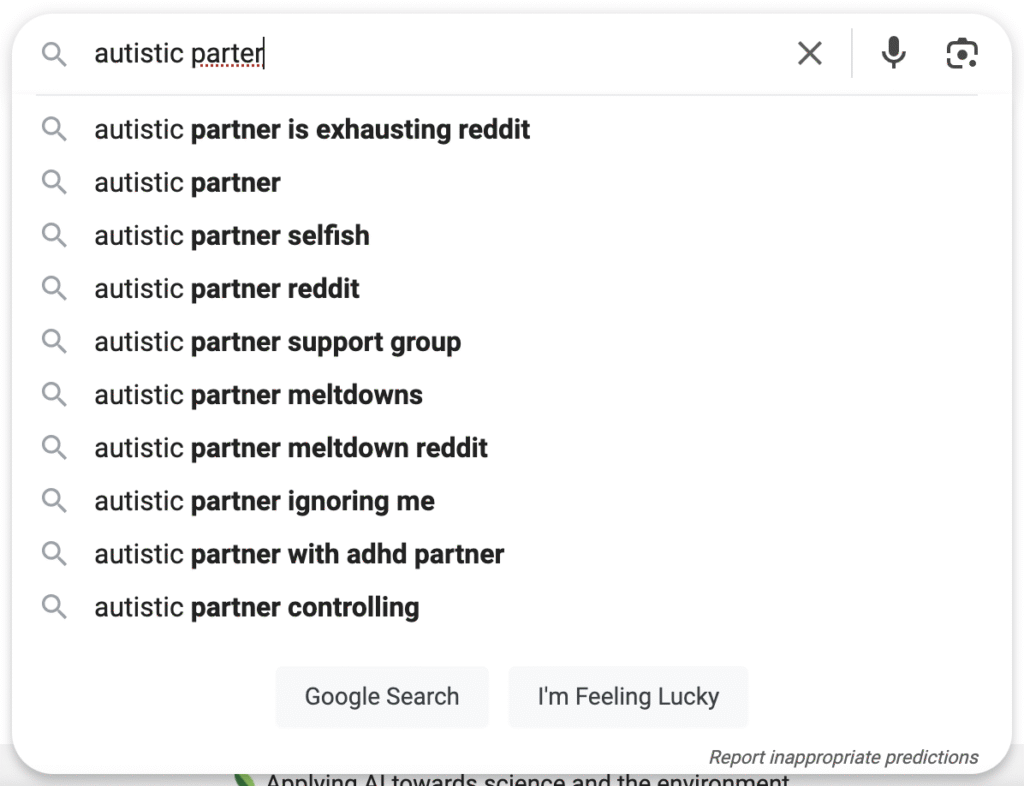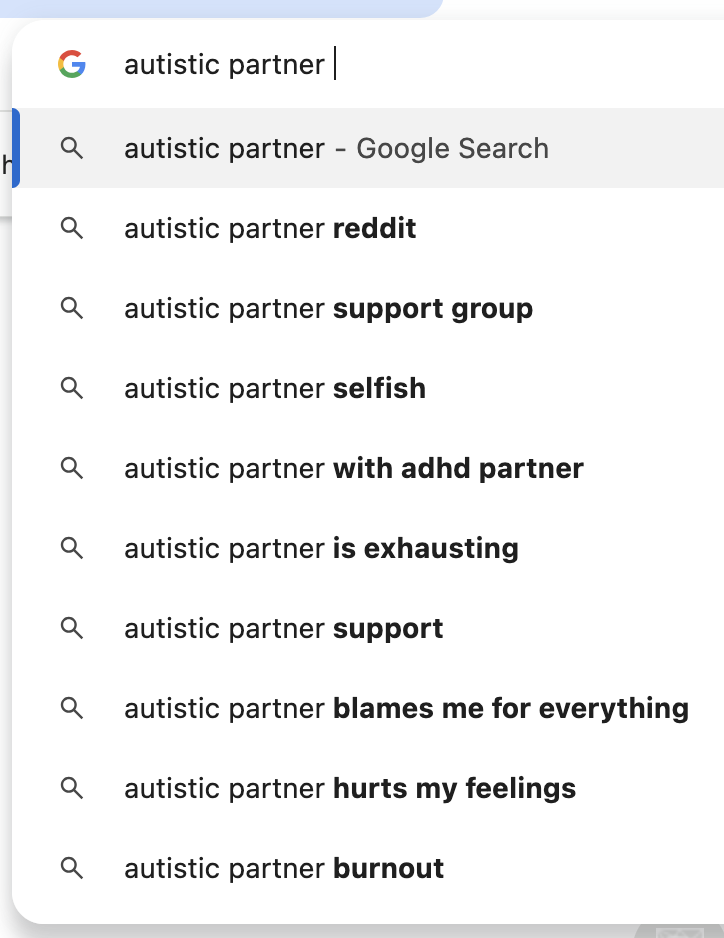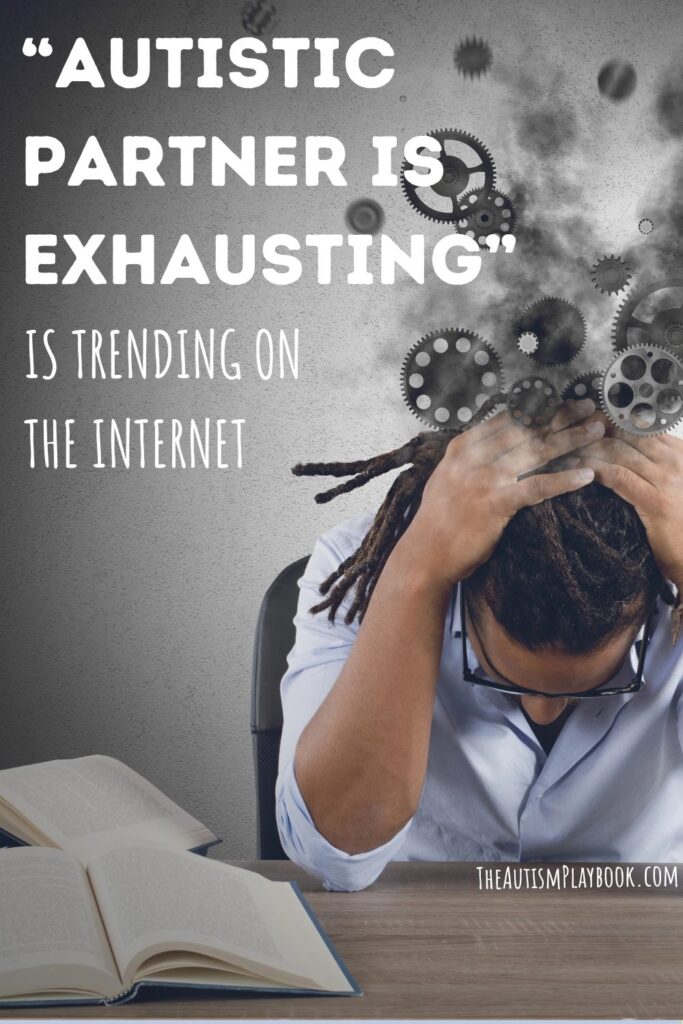As an autistic person married to a neurotypical partner, I felt compelled to write a post explaining to neurotypical people how autistic brains work, what we’re trying (usually unsuccessfully) to do, and how to make life with us easier. Imagine my heartbreak when I googled “autistic partner” and saw that the top result was “autistic partner is exhausting.”
Now imagine my further heartbreak when I saw the search results that followed:

Then I realized I spelled “partner” wrong and corrected my mistake (very autistic of me, I know). The results brought even more of my failures to light:

As I read each result, I could hear the voice of my own neurotypical partner in my head. I replayed the countless times he’s suggested I’m exhausting, selfish, controlling, or thoughtlessly hurting his feelings, when those are the furthest things from my heart and intentions.
Being autistic is hard every day of your life. But perhaps the most heartbreaking part of all is having very different intentions and motivations than what actually comes across to the people you love most. They know you’re autistic, they know your brain works in these ways, but they still interpret your words and actions through a neurotypical lens.
I work harder and more selflessly to please my partner than anyone I know, fighting against my own brain chemistry every minute of every day, but am still accused at times of being selfish, controlling…exhausting.
If you’re reading this post as a neurotypical partner, please hear my heart in this: We autistic people are 1000% times more exhausted with ourselves than you are with us.
To know that you’re tired of us, too, despite how hard we fight to love and support you? It makes us feel frustrated, hopeless, and like you always assume the worst of us.
In short, it makes us feel like terrible human beings.
So what should we all do? Break up?! Maybe.
But if you want to make this work…
If you want to try to meet us where we are as we try to jam ourselves into a neurotypical world for you…
If you want to make things as smooth as possible (or as smooth as a neurodiverse relationship can be)…
Here’s what you can do:
Assume the best of our intentions.
If you can only do one thing to support us…this is the one!
The fact is that if you simply told yourself, “They’re not a terrible person, they’re just autistic,” every time you were offended or slighted by an autistic person, your conflict would drop in half overnight. If you assumed their best intentions on top of that, your conflict would likely drop to neurotypical levels.
Example: It’s not that I’m ignoring your burnout because I’m an ass, but because you told me multiple times that you were okay and going to push through that project no matter what and I take words at face value.
It never occurs to me that your “no matter what” is actually contingent on how you feel. You have to explicitly tell me that…and then tell me if/when the situation has changed, because I can’t read your facial expressions or body language and am oblivious to social cues.
That would transform your thoughts from:
“My autistic partner is inconsiderate of how I feel.”
…to…
“I know they want to help, but they’re still holding onto what I originally told them. I need to tell them it’s different now or they won’t realize I need a different kind of help.”
And that mindset will serve both of us better.
Accept that we will probably always struggle to “speak your love language”…but that doesn’t mean we’re not showing you love!
This has been a painpoint for decades in my own marriage. My non-autistic partner’s primary love language is physical touch, with words of affirmation following at a close second.
I struggle with those love languages because (a) my nervous system is easily overwhelmed and very particular about physical touch and (b) my logical mind struggles to make affirmative statements unless I can back them up with cold, hard facts.
So no, I don’t want you to touch me that way, I want you to touch me this way. And no, I’m not going to compliment your character today if you just acted rude an hour ago…or compliment your haircut if I hate it.
With that said, I try super duper hard to speak my partner’s love languages because I love him. Unfortunately, it doesn’t come naturally and can often feel awkward or insincere from his point of view.
But maaaaan, if I don’t show him love in a million other ways! In my mind, I show him love by:
- Doing practical things for him around our home.
- Allowing him to relax whenever he wants or needs it.
- Resisting nagging him about the things I know already stress him.
- Shutting up about his doing things a certain way, even though every cell in my body screams that he’s doing it wrong.
These things feel like love to me and require a lot of effort on my part. When you’re feeling like your neurodivergent partner isn’t showing you love and affection, try to remember that love can look very different coming from an autistic person…but it’s still love.
Communicate clearly and concisely.
As you might have noted above, we take words seriously. So say what you mean…because otherwise, we’re not going to catch on to your innuendo.
And while you’re at it, stick to the point. There’s a time and place for rambling (Exhibit A: special interests), but the times you’re trying to get an important point across are not it.
My ADHD partner often starts discussing pain points in our relationship, but then rabbit trails to how it all started in his childhood, his experiences growing up, how it reminds him of this other relationship of an influencer he saw, etc. And I don’t want to sound rude, but I usually end up asking something like, “Sooooo…what was the point you wanted me to get from this?”
I’m not asking it because I don’t care about his childhood stories, but because I know it’s important to him and I want to get it right. Avoid potential miscommunication by communicating clearly and concisely, at least when it’s an important topic.
Write things down for us.
Better yet, write important things down! I live and die by my calendar and will visually run through those notes several times a day.
Writing things down makes them clearer and allows us time to process ideas, plan for events, and reduce the stress surrounding it all.

Don’t expect us to pick up on your emotions or any message you’re “sending” without speaking.
One of the most frustrating things to both an autistic person and their non-autistic partner is that autistic people can’t usually read facial expressions, body language, or social cues very well…if at all. That means that saying one thing while using facial expressions to convey the true meaning won’t work with us.
And using your body language to subtly suggest we ask you what’s wrong? Nope. We probably won’t notice that nonverbal communication at all.
It’s not that we’re being inconsiderate or selfishly ignoring your needs…but that our brains aren’t wired to notice or process those nonverbal cues. That means if nonverbal communication is your go-to, autistic people aren’t going to understand you. Them’s the facts.
If you’re not sending a nonverbal “message,” tell us that too.
This might just be me, but because I know I don’t process nonverbal cues well, I try really hard to process them…and usually get them wrong.
So I’ll see my partner’s face, interpret it as angry, and assume he’s angry with me. But the truth is, he’s just mildly annoyed with his boss and needs a few minutes to himself.
If you think your facial expressions or body language could be interpreted as annoyed or angry, and you’re not feeling those emotions toward your autistic partner, do them a favor and loop them in. “I may look upset today, but it’s not about you…my boss is just an idiot.”
What’s cool about these kinds of heads ups is that they give us a chance to observe your facial expressions, attach real-life details to what these expressions mean, and maaaaaybe be able to interpret your body language better in the future. Maybe.
Don’t assume we’re trying to send nonverbal or indirect messages…we don’t have those kinds of skills.
I ran into this a lot with an ex…I would mention something about a friend, he would assume I was mentioning it to indirectly complain about him, and he couldn’t believe I wouldn’t make that association or assume that he might.
Dude…I struggle to communicate in the first place. I don’t have the mental bandwidth to concoct some elaborate scheme to play mind games with you…and I’m annoyed by the people who do.
Don’t force eye contact.
I get it…it’s been drilled into our heads since childhood that direct eye contact is a sign of respect and shows you’re listening. But this is simply not true for autistic people.
Frankly, I’m listening to you better if I’m not giving you eye contact. That’s just how my brain works. It’s like I have to look somewhere else to relieve enough pressure and free up enough focus to actually think about what you’re saying.
I can pay you the respect of eye contact if you prefer…but I’ll be spending the whole time either frantically trying to turn your words into concepts that make sense to me or blacking out everything you’re saying.
Please allow us to listen in whatever way helps us truly listen to you.
Don’t force us to shoot from the hip…we need time to process.
And while we’re talking about talking…I can’t think in the moment to save my life.
Heck, I’ll black out mentally from someone simply asking me to share a little about myself. Who am I? Do I even have a background?! I remember nothing!
So I won’t have a quick response when you ask me a serious question. I need time to think about your question, process it for a while, and then decide how to communicate my thoughts in a way that will actually communicate my thoughts, rather than set us both up for misunderstanding.
So no…I’m not going to have a thoughtful response in the heat of an argument. You might force me to say something, but it’s not going to be my true feelings. I need time and space to nail down my true feelings.
Don’t accuse us of holding grudges when we’ve finished processing those thoughts days later.
By the time we’ve finally finished processing our thoughts, our non-autistic partner has probably moved on with their life. So when we bring it back up, we’re often accused of holding grudges.
“You’re still thinking about that? That’s not fair to me, let it go!”
We’re not holding grudges, we’re just trying to follow up with you so you know it matters to us and that we care about you.
Attempt to avoid last-minute changes to our schedules.
One of the best-known autistic traits out there is that our brains are wired for routine. That can include work routines, home routines, morning and bedtime routines, even knowing ahead of time what we’re making for dinner.
And when one of these routines is pushed off track, our brains melt down. I can feel my head go so empty it hurts and my anxiety physically rising in my chest when a meeting is rescheduled at the last minute, even if the new time works out fine for me.
It’s the fact that my brain was planning on something happening, I made mental space for it (all things require making mental space for autistic people), thought about it 102 times as the scheduled time approached, and now I have to do all of that, all over again.
It seems dumb to neurotypical people. Let it go, right?
But that’s the thing…our brains won’t just let it go. So rather than informing us that your last-minute change of plans isn’t a big deal, try giving us a heads up on any changes as soon as possible, so we have time to work through the mental and emotional chaos.
Make a plan when you can.
That also means that most autistic people don’t deal well with ambiguity. Decades ago, a boyfriend of mine would say, “Let’s hang out,” which meant driving aimlessly in his car until something we saw struck our fancy.
If I were Zooey Deschanel in literally any of her movies, this would be fun and magical and we’d end up singing karaoke or giving running tours of the city. But…I’m not. So…this is my nightmare.
Because I can’t think in the moment, I won’t likely see something and say, “Let’s go there!” By the time I’ve processed if I want to go there or not, we’ve already passed the place. At the same time, I’m thinking about what a waste of time and gas it is to drive aimlessly…and how if we had planned it, I could have looked forward to it and really maximized my experience there.
If you want to spend quality time with us that we’ll both enjoy, let us know the plans ahead of time so we can enjoy our time with you instead of spending it stressing over ambiguity.
Please don’t patronize us.
There are a few ways you might accidentally do this!
Please don’t downplay our sensory overload.
Sensory overload is very unique to the person experiencing it, even amongst autistic people.
Some autistic people can stare into the sun without blinking, while others are literally blinded by the smallest amount of light. Some can handle the TV, two different phones, and music blaring all at once, while others (me) would run out of that room screaming.
Unless you can climb under their skin and experience it for yourself first-hand, you’re not in a position to tell your autistic partner what does or does not trigger sensory overload for them. Telling us we’re fine not only doesn’t encourage us like you might be hoping, it makes us feel misunderstood and often, very patronized.
Please don’t tell us, “We’re all a little autistic.”
Whether you’re saying that to encourage us through social situations or to help us feel more comfortable with our quirks, no…we are not all “a little autistic.”
You would never say to a paralyzed person, “We’re all a little paralyzed,” or to a bipolar person, “We’re all a little bipolar.”
Autism spectrum disorder is a medical diagnosis. My brain is wired completely different from yours and completely different from the way this world was designed to function.
Saying this to an autistic person sends the message that their diagnosis and their very real daily struggles aren’t valid. Because what you’re saying is, “Don’t we all somehow manage those struggles?”
Please don’t insinuate that we’re stressing over “nothing” or “doing it to ourselves.”
Wait…are you telling me it’s all in my head?! Yes. Yes, it is. That’s the problem with autism spectrum disorder, isn’t it?
But it’s not the kind of “in my head” that I can overcome with positive thinking. It’s a medical diagnosis, not a case of the Mondays.
The stress is real (and overwhelming), the frustration weighs heavy. To insinuate that I could correct my autism symptoms by just stopping them is patronizing and at times, a little infuriating.
Be selective about what social situations you want us in.
I suuuuuck in social situations. They’re hard and frustrating and exhausting, both before, during, and after the event.
So pick and choose where you want me. If you want me to join you and your coworkers for drinks one night, don’t plan on my joining the neighbors for dinner the next day. If you want me to navigate our child’s class Christmas party, don’t follow it up with a visit to your grandparents’ house.
I need time before and after social situations to decompress and regroup before I can charge into the next event. You can either schedule breaks for both of us or plan on attending some events by yourself. (And I sincerely don’t mind the second option!)
Don’t take our need for regular solitude personally.
A family member recently questioned me about my social interactions, asking how often I met up with friends, if I was involved in my church, and who I texted when I was having a bad day. She was shocked and worried to learn that 99.9% of my social interactions happen within my immediate family (and my coworkers, since I still have that annoying responsibility of paying bills).
And when I told her I also enjoyed logging regular time away from my romantic partner?! She was crushed…practically started preparing for our divorce.
Here’s the thing, though: My desire to log regular time away from my non-autistic partner has absolutely nothing to do with him. It’s all me.
Autistic individuals don’t just prefer regular solitude; they need it. Desperately.
I need uninterrupted time to:
- Process my thoughts.
- Talk out loud through my plans and stress levels that day.
- Stim without anyone watching or judging me.
- Sit in complete silence to help combat sensory issues and chill my nervous system.
It’s my comfort zone that I need to come back to in little pockets (and the occasional big pocket) every single day in order to have a more functional relationship with my spouse, my coworkers, and every other neurotypical person in my life.
It’s not that we’re trying to escape from you or that we’re these grumpy, antisocial hermits; it’s that we live in a world that wasn’t built for us or our autistic traits, and we’re constantly overwhelmed. By taking regular time to center ourselves, we’re giving ourselves a fighting chance at surviving the rest of the day.
Don’t take our obsession with our special interests personally.
One of the most enjoyable autistic traits to autistic people can be one of the most annoying and at times, threatening, to a non-autistic partner – special interests.
Our special interests aren’t just run-of-the-mill hobbies; they’re a topic on which our brains are chemically wired to absolutely obsess. We think about it all day long. We find our greatest joy when we’re engaged with it. And we feel most alive when we’re elbows deep in it.
And sometimes, we can get defensive (sometimes even combative) when people try to keep us from our special interests. Again, we’re not being jerks, we’re being autistic. It’s how our brains are wired!
With that said, the fact that I’m obsessed with some niche topic doesn’t mean that I love my romantic partner less because of it. It also doesn’t mean that I’m prioritizing a hobby over our relationship.
When I’m engaged in my special interests, I feel as if I’m prioritizing myself and my brain and my own needs. When my non-autistic partner demands I end my time there to focus on him, I usually feel as if he’s being selfish…which is probably how he feels when I’m engaging in my special interests instead of watching TV with him. It’s a wild cycle.
That’s not to say that your neurodivergent partner should be allowed to cash out your 401k to buy model airplanes or stay up for 72 hours perfecting their sourdough recipe. We all need healthy boundaries, right?
But it’s important to remember that your ASD partner likely considers their special interests a huge part of their identity. So trying to shove special interests out of the picture is going to feel to them like you don’t care about them or their needs.
It’s not a competition between you and their special interests. It’s a competition between their neurodivergent brain chemistry and a neurotypical world.
Don’t vocalize every single time you’re frustrated with us.
Again, we’re frustrated with ourselves most days. We don’t need the added weight of knowing every single time we fall short of neurotypical standards.
While that’s certainly communicative of you (and we like clarity!), it’s not especially helpful when we’re already aware of our opportunities for improvement. Point out our “big rocks,” those situations that stand out over the day-to-day stuff, and trust that we’re aware of our “smaller rocks” and working on them.
Otherwise, we just feel beat up all the time.
If you’re a caregiver, treat yourself like a caregiver.
Some autistic individuals can navigate life just fine without much help. They manage their own symptoms, mask when it’s necessary, and can feel very much like a neurotypical partner.
Others are going to require some heavy lifting on your part, from providing constant emotional support, to navigating extreme physical symptoms and meltdowns, to complicating any and all social interactions for both themselves and you.
If your neurodivergent partner experiences life closer to that second description, you’re likely playing the part of a caregiver. And if you’re a caregiver, you should treat yourself like one!
That means setting boundaries, taking regular time to care for yourself, and recruiting the help of friends, family members, and mental health providers to ensure you’re not the only person supporting your ASD partner. This article offers some solid resources for navigating autism spectrum disorder as a caregiver without burning out in the process.
Don’t confuse being a selfish jerk with being autistic.
My non-autistic partner has fibromyalgia.
While I understand that this can cause him loads of pain, which might make him act grumpy or short with others, we both know that selfish narcissism is not a symptom of fibromyalgia. Therefore, neither of us uses his fibromyalgia as an excuse for poor behavior.
In the same way, some (crappy) people with autism spectrum disorder will attempt to blame their disorder for treating you poorly. But being autistic and being a jerk are not, in fact, one and the same.
If this is too much, leave us.
This is all a lot to remember and work through. I 110% acknowledge the daily workload my autistic traits require of my non-autistic partner.
I know how exhausting I can be…but all I can do is my very best!
If my best is not enough for you, I understand. And maybe this is just me, but…I would rather you leave me than complain about me all day, every day.
Just like you deserve someone who makes you feel seen and understood and cared for, I deserve someone who appreciates me for who I am. So if being with someone on the autism spectrum is too much for you (and again, I don’t blame you), move on for both our sakes.

Navigating a long-term relationship can be hard in itself. Navigating a long-term neurodiverse relationship?! That’s gonna require some extra finesse.
But if neurotypical people can learn to separate the intentions of their ASD partner from their autistic traits and symptoms (which constantly undermine us), there is absolutely, positively hope for a healthy, long-term relationship! (I’m currently 20+ years strong in a neurodiverse marriage!)
The fact that you took the time to read this post at all is a fantastic sign for your relationship. Thank you for giving a crap!
As an autistic person, I can tell you from experience that almost zero neurotypical people in this world take the time to put themselves in our shoes to try to understand us. That means you’re an outlier in the best way possible.
However it goes in your neurodiverse relationship, I’m rooting for you!
Cheers!
